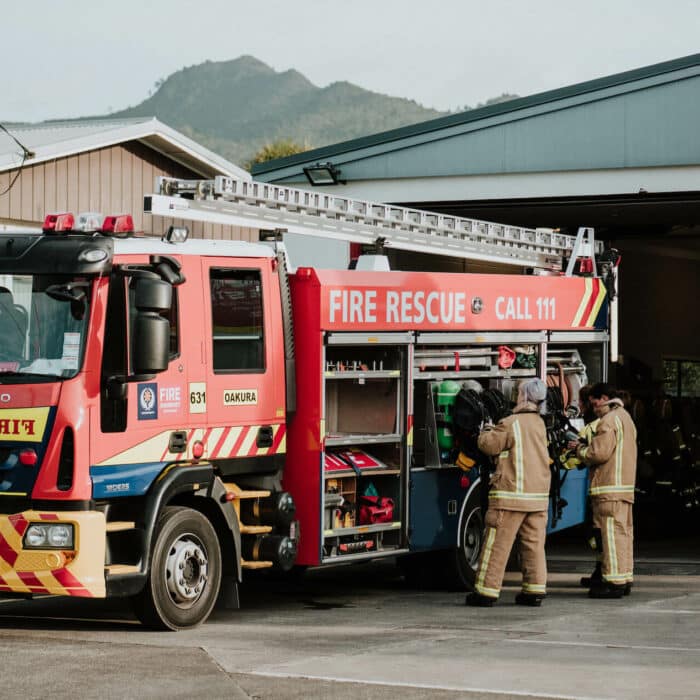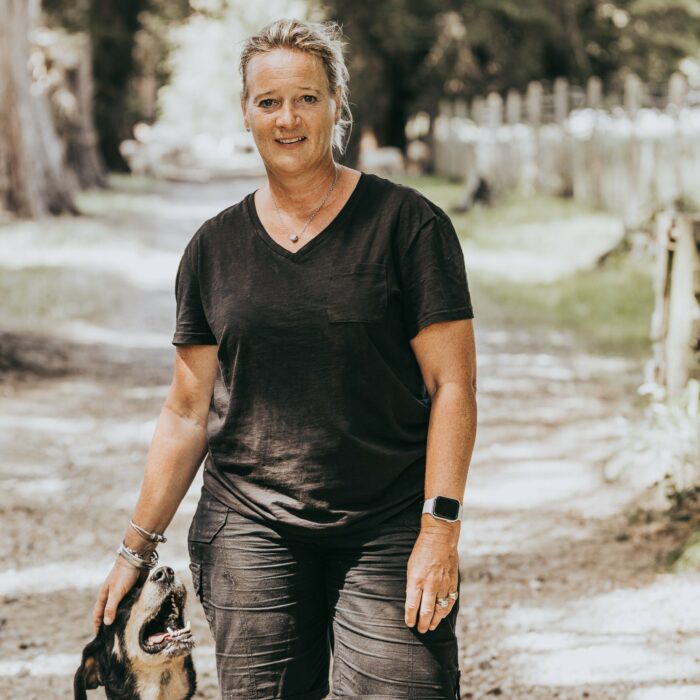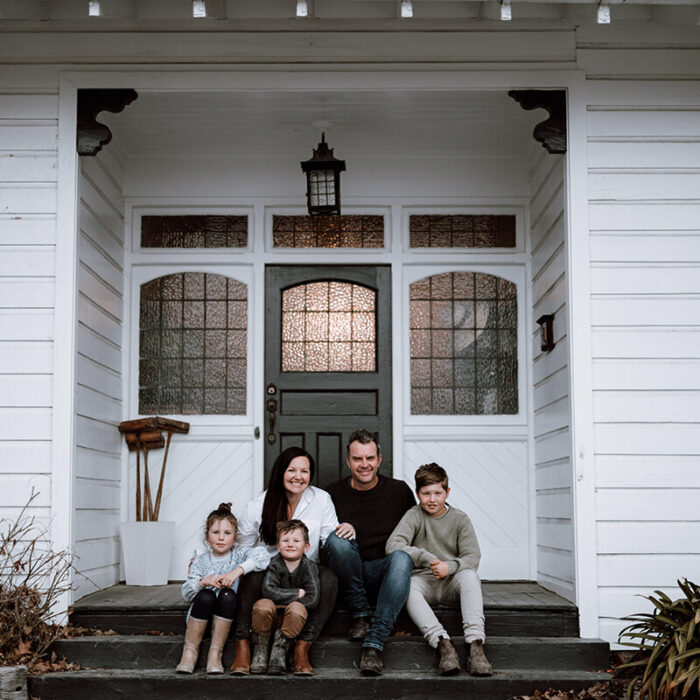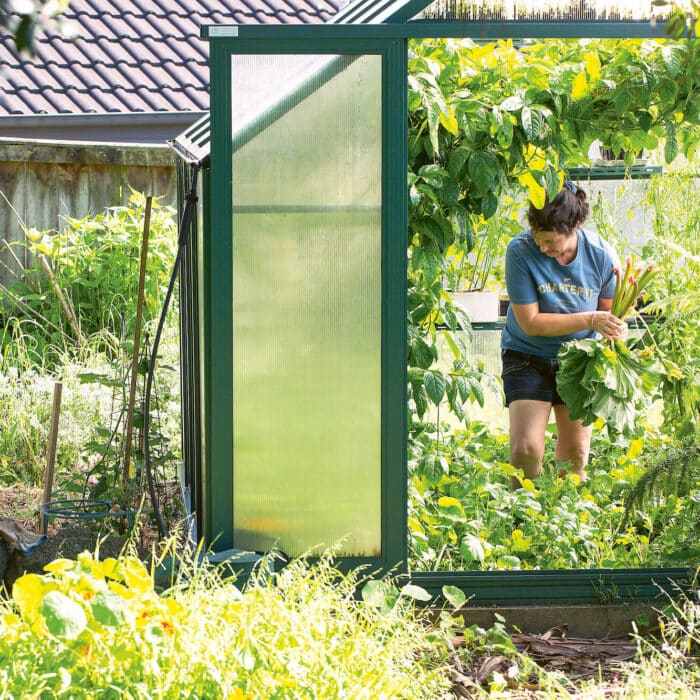04 July 2023
Learning Curve
Manawanuitanga. Going Against the Grain.
writer: Tessa King
photographer: Vivian Gehrmann
Although she grew up on her family farm at Maraekakaho in Hawke’s Bay, Rhea Dasent spent years living the city life. In 2019, she became the fourth generation to return to work on the farm, bringing her young family along with her. Together, they’ve been learning the ropes of farming life.

The old homestead. “The Dasents have been on this farm since 1907. The joke is we’ve never made enough money to leave!” Rhea says.
One might assume being the employer’s offspring would make you a shoo-in in terms of a job, but Rhea, 39, is evidence that blood ties are not a sure-fire guarantee of employment. When she and her family – husband Ryan, 40, and children Leveson, 4, and Althea, 8 – first moved back to Aorangi, the family’s 190 hectare beef farm, in search of a slower pace of life, Rhea really had to prove herself.
“Shortly after we moved home, the great drought and first lockdown meant my father was feeding out to seven mobs of cattle on his own every day. I learned how to drive the tractor so we could take turns doing that time-consuming daily task,” Rhea says. “We fed out for something like 125 days in a row and only stopped because we had run out of feed, by which time it was mid-winter anyway. It got pretty desperate and we remain incredibly grateful to the Manawatu province of Federated Farmers and the Rapa Feed Run, who donated bales that kept us going. We were stuck on farm during lockdown, looking at the blue, cloudless sky; looking at the dust; looking at our hungry animals getting skinnier and skinnier.” The drought was a whole separate crisis going on, but no one really knew about it – everyone was glued to their televisions, tuning in to the latest Covid update. “The drought was a really lonely disaster to try to get through,” she says.
Backing up a few months to what brought Rhea and her young family back to Maraekakaho, and you begin to see why even such a rocky start was not enough to put them off. As a young woman, Rhea was encouraged to go to university and work in a professional career, but she always missed the farm. “Our daughter was about to turn five, and I didn’t want to live out my life as a suburban mother. We lived way out in Wainuiomata and I was worried that school hours would give me a too-short window to get into Wellington for my job, so I’d either end up taking an unsatisfying job closer to home or drop out of work altogether.” Commuter traffic was becoming the most important feature of family life, the thing the rest of the day was hung around.
Top. “I wanted my children to enjoy the farm childhood that I had loved. I think farm childhoods are becoming more rare and precious and we need to protect them where we can,” Rhea says. It was part of what drew her back to Maraekakaho. Above. “My dad grew up in the house my parents live in now. And my dad’s granny lived in that house. There’s a beautiful big oak tree out the front of the homestead with a swing that’s been there – repaired a few times – since I was a kid,” Rhea says.
Rhea has always loved animals and growing things and being busy outside. “I love listening to the birds and looking at the flowers that grow in the pasture. Observing animals and learning their behaviour is always interesting. My brother, on the other hand, has always enjoyed technology and computers, and he is studying IT and cyber security in Wellington.” So when the farm cottage became available after being occupied by the same tenant for fourteen years, it was Rhea who ended up back on the farm.
She convinced her husband that working remotely would be possible – it would soon become an accepted norm due to Covid, but at the time it was untested ground. “I think he enjoys a better quality of life here,” she says. “We see him more than we would have if he still had an office job in town. He has time to go for a run most days, which is great for physical and mental health. He certainly didn’t have time for that when we were living in town.”

Rhea, who has worked for Federated Farmers since 2009, had an easier time – when she asked if she could work part-time from home in Hawke’s Bay, they were completely fine with that. Her two jobs share a skill set. “There is a lot of lateral, problem-solving work involved, which I really enjoy. It takes a lot of pondering, and I’m able to do a lot of that pondering while out on the farm, and then also apply my knowledge of farmers and farming to the role as well. I’m there, boots on the ground and hands in the dirt.”
Rhea explains that when her father was growing up, it was boys who went out and did the farm work while girls did the baking and the gardening. Their direct neighbours have strong and capable women running their farm, so that mould of men-on-farm had already been broken for Rhea. Then the drought showed her father that she was capable of doing farm work, and he employed her. “Once I was officially employed, it was a very steep learning curve. Without doubt, there was blood, sweat and tears. Like many farmers, my father had been working on his own for decades and was used to doing things his own way.” Rhea’s father has an extensive body of knowledge and experience, but teaching his skills is another thing entirely. Rhea says she is glad she was learning in a fairly remote setting, unlike learning the ropes in an office job: “You can make mistakes without anyone seeing!”
She emphasises the importance of learning to do things your own way, and points out that there are machines and other people available to help people of any physique who are getting into farming. She credits a neighbour with experience in teaching people how to use mining machinery for getting her up to scratch. “Everybody always asks, ‘But what about fencing?’ when expressing doubt or incredulity of me becoming a farmer,” Rhea says. “I certainly didn’t have previous farming skills, so everything was new. I’m proud how much I have learnt in the few years I have been doing it.”
Top. “Because Dasent is such an unusual name, it has been quite easy for us to trace our ancestry through history. ‘Strike’ refers to the fact we had a family member who was a knight. The family motto, ‘Mon dieu est ma roche,’ means ‘My God is my rock.’” Above and below. “I got my huntaway, Rose, from the Retired Working Dogs Trust,” Rhea says. “She was too soft for her gruff old farmer and her number was up. She does what I need her to do: bark at cattle, open the garden gate when my hands are full and keep me company out on the farm. She never judges me when I make a mistake, so I give her the same courtesy.”

And then after the drought and Covid, there was Cyclone Gabrielle in February 2023. Although Hawke’s Bay suffered extensive damage, Aorangi wasn’t badly affected – there are no rivers or streams on the property, just a small creek – and all of their buildings, stock and people are safe. “We were lucky,” Rhea says. Nevertheless, she knows hardship brought on by natural disaster and has been volunteering with the Farmy Army, a group of volunteer farmers who help other farmers in need, to help others who haven’t been quite so lucky.
Rhea gets great satisfaction from the fact that in their life on farm her children see her learning new skills – and see that sometimes this can be really difficult. “Problem solving is a great skill and I certainly have had a lot of practice over the last few years. Every problem has a solution, you just have to find it. The good days give you memories and bad days give you experience. My children have a wonderful practical bent from living here. They know where their food comes from and they know about life and death. They know that problems are there to be solved.”
Top. “When councils want to do something that will affect farmers, Federated Farmers will have an opinion on that,” Rhea says. “My job is to look at the responsibilities or obligations that a council has under the national legislation and what they want to achieve and see how that will affect farmers.” Above. Ryan plays with Leveson in the yard.
If you enjoyed this story, please share with someone else.
This story appeared in the Takurua Winter 2023 Edition of Shepherdess.
Get your hands on a copy.
Related Stories
Jane Tylee
This story is the fourth in a series where we share, in their own words, the stories of ten women who call Tararua home.
Where The Sun Shines
Liz and Andy Hayes count themselves lucky to call Hakataramea Valley home.
Notes from Nonna
In her own garden in Māngere Bridge, Bri nurtures the Italian ingredients she loves, sharing her family’s beloved traditional recipes in her seasonally inspired cookbook.



